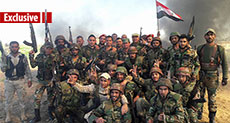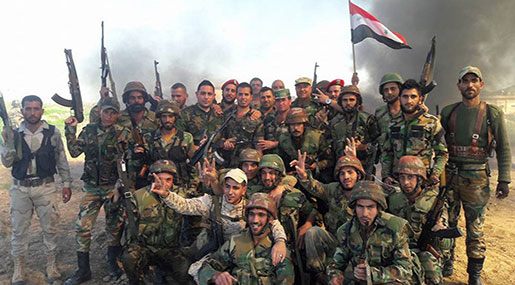
End of an Epic!

Darko Lazar
If the military aspect had been the determining factor in the liberation of Aleppo, the fight would have been concluded a long time ago. A number of developments on the political front ran parallel to the key battle, including the US presidential race, an extensive media campaign targeting Moscow and Damascus, speculation over which side bombed the UN aid convoy in September, as well as a number of short-lived ceasefires.

But despite the external pressures and the grueling battles in a highly urbanized environment, it is now certain that the Syrian army and its allies will emerge victorious.
The teeth of the tiger
By November 12, the Syrian army, with the help of the Russian air force, Lebanon's Hizbullah, Palestinian military formations and other groups, successfully reversed the advances of two militant offensives. These developments effectively halted all efforts aimed at breaking the siege of eastern Aleppo, while concluding preparations for a decisive push to recapture the militant-held part of the city.
Before launching its operation, the Damascus government called on the remaining civilians in east Aleppo to leave within 24 hours. But no major exodus of the civilian population followed, and aside from a few dozen people who managed to flee into to government-held territory, no substantial movement was recorded.
Following a week of relative calm, the operation kicked off. Syria's armed forces attacked the militant pocket from several directions. The objective of the Syrian command centered on stretching the resources of the militants and disguising the main assault that was yet to come.
It is worth noting that the Syrian army encountered heavy resistance on almost all of the approaches into areas occupied by the militants. However, most of these battles were a sideshow. Syria's primary offensive unit, the Tiger Forces or Qawat Al-Nimr, led the main onslaught, supported by the 102nd infantry brigade of the Republican Guard.
The sheer force of the Syrian army thrust caught the militants off-guard. The constant artillery barrage backed by an aerial bombardment completely paralyzed the terrorist formations. Radio chatter quickly detected an ensuing panic within militant ranks. Meanwhile, the lightning, Tiger Forces-led offensive was executed with a high degree of precision.
Aleppo's Hanano district was the first to fall. At the same time, thousands of civilians flooded into government-controlled areas of the city, free from the fear of being shot by the fleeing terrorists.
The army's ability to penetrate Hanano marked a key moment in the battle for Aleppo. Militant defenses quickly began collapsing like a house of cards. The liberation of Jabal Badro, Ain Al Tal, Bustan al-Basha and the strategically vital water-pumping plant in Suleiman al-Halabi, culminated in the army's capture of Aleppo's Old City, which served as the center of gravity for the militancy in Syria since it was overrun by terrorists in July 2012.
"After a successful offensive, 52 neighborhoods in east Aleppo have been recaptured from militants. In the past four days alone, the area held by gunmen has decreased by one-third. The Syrian army now controls 93% of the city's territory," the head of the Main Operations Department at Russia's General Staff, Lieutenant-General Sergei Rudskoi said.
London-based security analyst Charles Shoebridge explained that the defeat of the militants in Aleppo is "definitely physiological and of course it has a huge symbolic importance."
Despite the fact that the remaining terrorists in eastern Aleppo are estimated to number in the thousands of well-trained, battle-hardened fighters, the recent advances by the Syrian army suggest that it may be a matter of days before the city is fully liberated.
After all, the foreign backers of the militant groups appear to be unable to take any decisive steps, which would reverse their recent setbacks.
"We have seen reports of local ceasefires and large scale surrenders of rebels who are then in many cases... released and allowed to go back to their families so that the focus can be on these more hardcore terrorists...these tactics can be spread throughout the rest of Syria," Shoebridge added.
That's not to say that the Syrian war has been won. The country's president Bashar al Assad warned that, "Aleppo will be a win for us, but let's be realistic - it won't mean the end of the war in Syria... but it will be a huge step towards this end."
The question remains whether regional powers are able to seriously prop up the Syrian insurgency in a world where a Trump-run White House has turned its back on the project to unseat President al Assad.
Aside from Trump's recent victory, there are other developments in international affairs that offer some room for optimism, including the growing rift between Ankara and the west, as well as "Israel's" growing isolation. These processes, which are running in parallel to the battle for Aleppo, are giving birth to a new geopolitical reality, making Syria the Stalingrad of our time.
Source: Al-Ahed News



